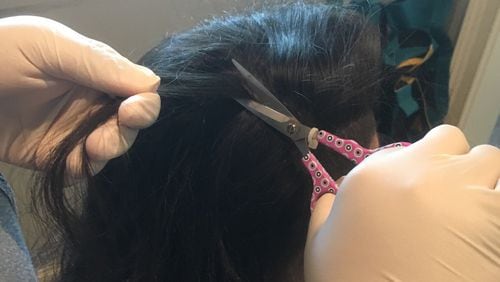You know times have changed when drug tests become part of the back to school routine.
If that sounds extreme, you haven’t been keeping up with the opioid epidemic hitting our communities. It’s bad and it’s pretty scary.
After years of ebbs and flow, teenage drug use has shown a steady decline, but drug addiction is still a big problem. In 2015 alone, more than 4,000 teens age 14-17 died from drug overdoses, so you can see why parents might be worried. Who can blame them?
But drug tests?
According to Clarissa Bradstock, CEO of Any Lab Test Now in Alpharetta, it’s happening.
Bradstock first noticed an uptick in parents bringing students in five years ago. At that time, they were seeing about four a month at each of its 14 metro Atlanta locations. That number has jumped to more than 15 per month at each location, with many parents signing their children up to take monthly or bi-weekly tests.
“Parents are terrified,” Bradstock said. “Drug use is even more serious because the consequences are more serious. People are dying.”
Founded in 1992 in Atlanta, Any Lab Test Now performs clinical, DNA and toxicology testing on urine, hair and fingernails at a cost ranging from $49-$229, without a doctor’s referral.
Depending on the test, results can take as little as a few minutes for a urine analysis or as long as three days for a finger nail test.
A hair test is considered the most accurate test for extended use of drugs. A urinalysis only detects drug use within two to three days of use.
All tests are confidential, and no one has access to the results but parents.
“They own the results and they can use an anonymous name to protect their child,” Bradstock said. “Most importantly, the results give parents and other loved ones answers so they can take next steps, if needed.”
Bruce W. Cameron, a retired federal law enforcement officer and licensed counselor who runs an outpatient marijuana treatment program, believes testing should be part of parenting, hands down.
“Drug and alcohol use is pervasive in the world we live in now,” Cameron said. “Every adolescent will have to make this choice sooner or later. The sooner parents know what that choice is, the better.”
As with anything, there are pros and cons to parents submitting their kids to testing.
The down side to all this, of course, is the child may see it as a violation of privacy and become angry at the parents.
That’s the least worry of parents who spoke to me about the issue. They wouldn’t hesitate to drug test, especially if they thought their kid was using drugs.
Sometimes, however, it isn’t the parent at all. Some private schools require random drug tests.
Maya Gladney Miller, a social worker and mother of three from Conyers, was surprised to learn recently that children as young as 10 were getting high.
If she thought one of her children, aged 7, 9, and 11, was using, no question she’d have them submit to a drug test.
“These are dangerous drugs and most of the time our kids aren’t even aware what’s really in them,” she said.
Dr. Oksana Hagerty, an educational and developmental psychologist at Beacon College in Leesburg, Fla., said that when it comes to drug-testing children, parents usually settle between two extremes: surveillance or trust.
Parents who rely on the surveillance tack, believe their kids won’t take drugs because they know they’ll be tested and then punished. And those who rely on trust as a deterrent believe a kid won’t take drugs because they know the parent respects them and will never embarrass them with drug-testing.
Neither approach, research shows, works to a tee.
Adolescents are cursed with immature abilities to inhibit their impulses. They commonly take risks that do not make sense to adults. That sort of risk-taking is especially common among children with ADHD or other self-regulation issues like disruptive, impulse-control and conduct disorders, Hagerty said. The threat of discovery via testing and punishment may not be enough to prevent them from using drugs.
“In other words, do they know that they can be drug-tested? Yes. Do they know that they can be punished if it is discovered that they are using drugs? Yes. Does this knowledge effectively stop them from using drugs? No.”
It’s enough to keep worried parents up at night, and increasingly compel them to take their kids to drug testing facilities for answers.
Not even the threat of a drug test or punishment can deter use and more often than not only leads to more sophisticated attempts to conceal.
As for the trust approach, she said the negative impact of drugs alone is enough to eclipse any perception of distrust.
About the Author








